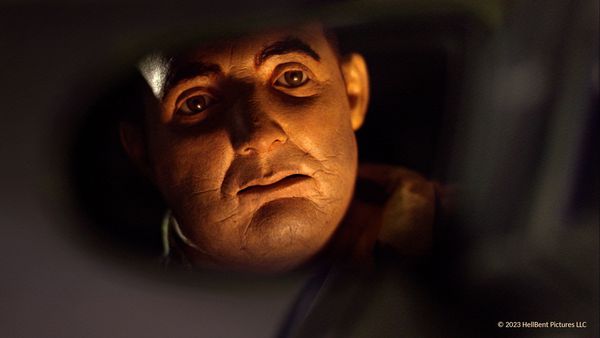 |
| Les looks in the rear view mirror |
There are any number of animated films released each year, often critically acclaimed and welcomed by the public, yet there are still very few works out there which really make use of puppets. Assorted Muppet ventures, Labyrinth and The Happytime Murders rely on supplementing them with live action performances. The Dark Crystal and its Netflix series prequel are widely celebrated for what they manage to achieve, yet have inspired few imitations – perhaps not surprising given the scale of work required. In 2021, Frank & Zed made an impact on the horror scene, but didn’t really have the writing to back up its craft. 2023’s Abruptio is something else, and suggests that the puppet film has finally come of age.
Following a man who, when he wakes yup one day with a bomb implanted in his neck and starts receiving disturbing orders, wonders if he picked the wrong time to quit drinking, it’s the creation of director Evan Marlowe and his small but dedicated team of family members, friends and horror icons. It took him seven years to make, so when we meet I ask him if, in its origins, it was actually his first film.
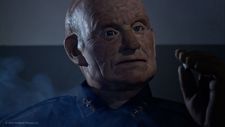 |
| Richter |
“This is actually our third feature we did,” he clarifies. “Blood Rush was our first one that my wife [Kerry Finlayson] wrote and I directed, and then the second one was more of a compilation anthology with five short films, so not really a true feature, but progress. I think it was technically a little better. We just kind of made it up as we went along. You can tell, but it was both of them were good practice for me. And then this was our actual third project – the first with puppets.”
It's beautifully constructed in terms of story as well.
“It's just one of those things are that part of my life.” He shrugs. “Some of it was personal. Adapting it to puppets, I don't know how I got the idea, but obviously, I worked it into the theme of the movie so it wasn't just a gimmick. I think everything eventually fell into place. I was trying to work with the idea of us being manipulated externally and internally by our psyches.”
He didn’t have any prior experience with puppets, he says.
“I've done animation in the past, when I was a kid starting off in the Seventies with Star Wars action figures and claymation and things like that. And then gradually worked into live action and added sound to it when I was in high school. I gave it up for a while till I met my wife, who actually graduated film school in the UK and then moved to the US to do production and acting. I met her and she bought me a cheap camera and it started off from there.”
Nonetheless, he was clear about what he wanted from the puppets, he says.
“I wanted them to be realistic. Not 100% realistic, because then it's just kind of like, just get an actor with prosthetics, or whatever. So that doesn't really make sense to me, to be perfectly accurate. But also, a lot of film reviewers and critics have noted this uncanny valley phenomenon, which occurs when maybe you're 20% off in realism and it just is unsettling. It causes sort of a disconnect with the viewer, and I think that's what I was going for, to get into that sweet spot where people can empathise with the character but are not comfortable with who the characters are and what they’re seeing onscreen.
“We never had any background in puppetry, any of us, although for my wife's cousin Janine [Hook] actually is an illustrator. We played with the idea of her making the puppets in the UK and shipping them to us, but the logistics of that were too difficult. So fortunately, we found someone, after a lot of trial and error, in the United States that could help us out.”
One of the big decisions, early on, involved recording the audio and then syncing the puppets to that rather than the other way around.
“I think for the most part, we made the puppets after they had the voices, so it helped the fabricator, the designer, because we didn't want a mismatch between the voice and the face. We really didn't want them looking like the actors, so besides just getting illustrations, I would look online for references and ideas that I wanted, and I sent those to our fabricator too.”
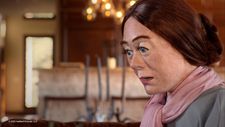 |
| An unlucky target |
He has noted previously that, working with puppets, one doesn’t have to worry about them getting old the same way as actors do, but they do still age and they need a lot of maintenance. How long were they being used in the shoot and how did he look after them during that time?
“Well, Les had the most wear and tear but he did really well. We used them for years. The others typically, we would just shoot their bits and then retire them in storage, so they held up pretty well. I think with Chelsea we had one version and then we just weren’t happy with it, so Jeff [S Farley], our fabricator, came along and reworked it so that she was more beautiful. Other than that, everybody just had a brief period of time, we kept them treated well, we brought them on the set and they did their part and we were done with them.
“My dream is that they go on the road. When I was a kid Dark Crystal came out, and I remember going to a restaurant in Los Angeles or Santa Monica, and they had the puppets on display, and that really inspired me. It was just a restaurant, but it was amazing to go in and see them on display. So I mean, it would be nice to show them off.”
Using puppets meant that the production could incorporate some dangerous things which one might not want to put an actor through, but did it also allow the film to get away with depicting atrocities of a sort which audiences would be unwilling to tolerate if they looked more realistic?
“We didn't know what the reaction would be,” he says. “If people would be completely disconnected and indifferent to the plight of these characters because they were puppets, or if they would become invested, or there would be a line somewhere that people weren't willing to go across. We just didn't know. I just wanted to tell the story, and then people can react the way they want to react to the story.
“I think horror writers and creators in general, people wonder if there's something wrong with them. I think we're some of the healthiest people actually, because we don't repress all that stuff, and we see what's wrong with society.
“Just because I make a movie where people are murdering doesn't mean I have any desire to murder, but there are people in the world that do, so we're just reflecting things that are out there. The bottom line is that they’re somewhere floating around in my psyche. I just channel these ideas and they come from the ether somehow, they come out onto the screen or in music or wherever it is, but it's sometimes hard to take credit for these ideas when you feel like you're just a conduit.”
I tell him that something I like about the film is a way that it handles sexuality and raises questions about the way we routinely see women depicted onscreen.
“Yeah. I feel this kind of character and where he is in his life at 35, I wouldn't say as extreme as an incel, but it’s in that direction. These guys are fearful of women and they blame women for the problems in their lives. I think there's an element of misogyny that comes with that. What I wanted Chelsea to do is not necessarily be romantic interest, but just kind of bounce that concept off. Les kind of figures it out by the end – not just the lack of accountability, but also the way he views women. There really isn't anyone else in this movie with a moral compass so Chelsea serves that purpose, and I didn't want to degrade that in any way.”
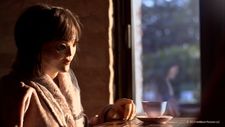 |
| Chelsea |
How did he get such big stars on board with the film?
“Well, I know for a fact James Marsters was a little bit icked out by the script, and he had a lot of hesitation, but he stated that he felt that the idea of putting these realistic puppets in it kind of clinched it for him. Robert Englund said that he just thought this was a strange experiment and he’d like see how it came out. I feel like that was a big selling point. If I had done a cartoon or something I'm not sure people would have gravitated to the project, but this whole notion of can you put together a realistic horror film with lifelike puppets and make it work, I think was a little irresistible for some of these actors.”
How did he manage to do so much of the rest of the work just with family and friends?
“Well, you know, I was reading a book about this sort of thing. In the book, the bottom line was that they went through project after project and they were all family and friends, helping them out. I mean, all these great directors that we know today all started off by relying on family and friends to make their first film or couple of films. It's almost a universal thing. I mean, you have to start somewhere, so you rely on people around you.
“Fortunately, my wife has a film background, and she does all the things I don't want to do, like production work. She knows all the contracts and all that stuff. She's really good at it. And also acting. And then she's got such a big circle of friends and family. Many of them are British and many of them are actors, so it was easy to draw upon people to help out.”
The film won an award and Panic Fest and was also selected for Fantaspoa and Dundead, amongst other festivals. Has he been surprised by its success?
“Well, I thought it would be divisive. Again, when we put it out, we just didn't know. You don't want people to have no interest in it, obviously. You want to cause some kind of interest, and I mean, we can't all make universally loved films. So if you can't make something that everybody agrees on is a great film, you want to at least make something that people will talk about, and argue about. And something that's thorny, I think. So I'm glad that it’s having the intended effect.
“Some people get it when they watch the film, and some people just don't get it. You’ve got to accept that people aren't always going to accept the stuff we're putting out there. They just don't get the idea of puppets, it doesn't work for them, the story doesn't work for them, and that's fine. You can't argue with taste. But I think a lot of these festivals, especially the horror festivals, have never seen anything like this, and I think they're eager to put something like something like this in the programme.”
Does he think that some people see it just in terms of shock value and don't notice the story that's going on behind that?
“Yeah, I think so. If you make a film over the course of six or eight years – I remember putting a lot of stuff into it. There's a lot of subtext in there, there's stuff in the dialogue, there's a lot of clues visually that lead us in the direction of the conclusion. There's a lot of subtlety in there. But if you're watching it the first time through, I think you're just so thrown by the puppets, you just don't know what hit you. If you go back and watch it a second time, and really pay attention, I think you'll find all the stuff that I spent years putting into the movie.
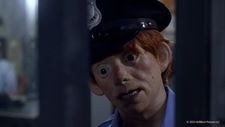 |
| Dennis |
So how is he going to follow this up?
“Well, I have nothing against people that make superhero films and all that stuff and go to see those movies, there's a market for it. I think some of them are really great. But I think right now we’re in a period where we have so much of all that stuff, the same stuff on TV and in films, and I don't think enough people are thinking outside the box.
“There have been some great filmmakers in history that have really pushed the direction of cinema one way or another. And recently too, I mean, Fury Road is an example, or Spider-Man Into The Spider-Verse is. Those movies move the genre into a different place, or bend or blend genres. So it can be done it can be done financially successfully, so there's no reason we should be holding back. We should be looking in different directions. So that said, I'm trying to figure out where the holes are in cinema, right now, where the needs are. I'm kind of thinking about animation and animated horror. Most of the most animated films you see are family oriented and not really serious, so I’m thinking about that.”





















